Key takeaways:
- Implementing a clear evaluation framework fosters accountability, encourages ownership, and aligns team objectives.
- Regular feedback and involvement of all stakeholders enhance collaboration and create a culture of shared responsibility.
- Using structured templates and technology for evaluations streamlines communication and boosts team engagement and motivation.
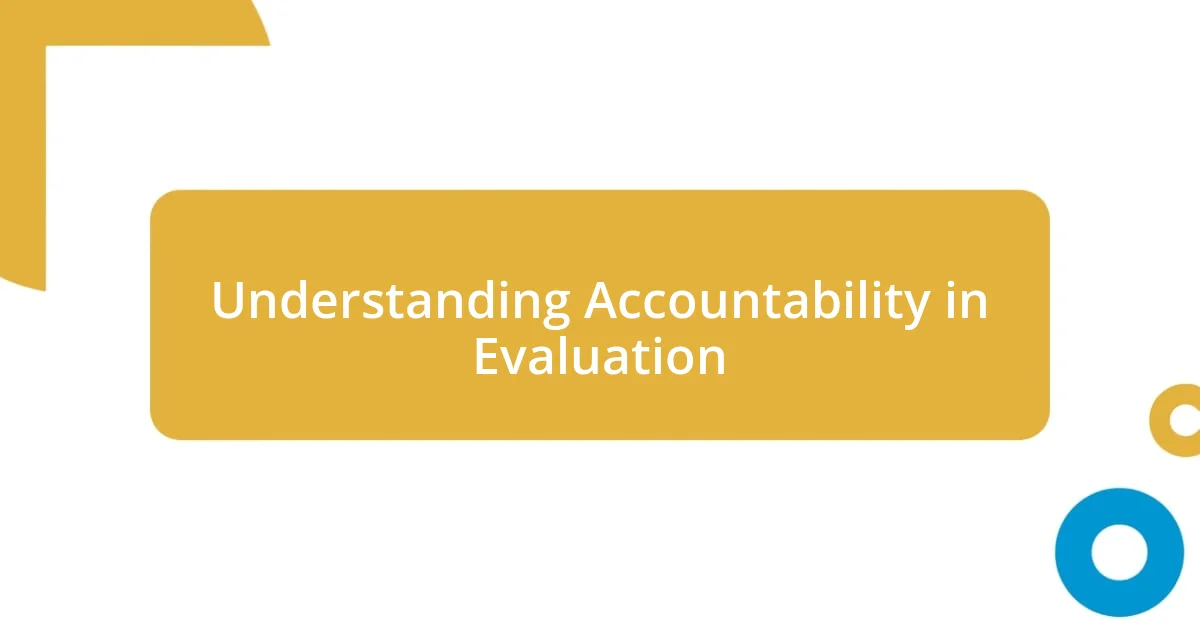
Understanding Accountability in Evaluation
Accountability in evaluation is all about ensuring that actions and outcomes are aligned with set standards and expectations. I can’t help but recall a time when our team faced unexpected challenges on a project. We established a clear evaluation framework that held everyone responsible, and it turned the situation around. Do you think that establishing such frameworks could make a real difference in the way teams function?
When evaluating accountability, it’s crucial to recognize that it’s not just about metrics but also about fostering a culture of trust and ownership. I’ve seen firsthand how openness about results, both good and bad, can create an environment where team members feel empowered to contribute fully. Have you ever experienced a project where accountability led to better collaboration? In my case, it made all the difference.
Ultimately, understanding accountability in evaluation means recognizing that it requires ongoing dialogue and reflection. In my experience, regular check-ins prompted honest conversations that helped us adapt and improve in real time. It’s fascinating how these discussions can shift perspectives and enhance collective responsibility, don’t you think?
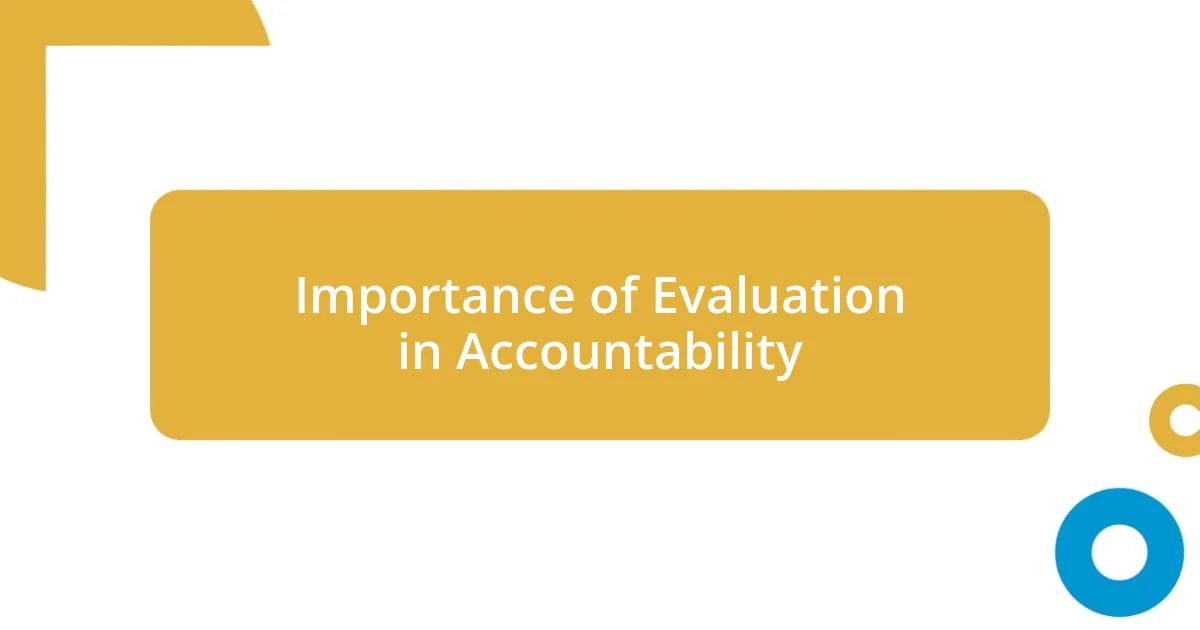
Importance of Evaluation in Accountability
Evaluating accountability is crucial because it ensures that everyone is aware of their responsibilities and the expectations placed upon them. I remember a situation where a lack of evaluation led to confusion within our team. A project fell behind schedule, and we had to regroup and analyze our roles, ultimately identifying gaps in accountability. That experience taught me just how important evaluation is in clarifying expectations and aligning our goals.
- Clear metrics help track progress and encourage ownership.
- Evaluation fosters transparency, building trust among team members.
- It allows for timely interventions, preventing small issues from escalating.
- Regular feedback provides motivation and enhances performance.
- By promoting a culture of accountability, teams become more resilient and adaptable.
In my view, the importance of evaluation in accountability cannot be overstated. It cultivates an atmosphere where everyone feels responsible and connected to the team’s objectives. Imagine if every team had mechanisms in place that not only monitored progress but also supported each member’s growth. Wouldn’t that transform collaboration?
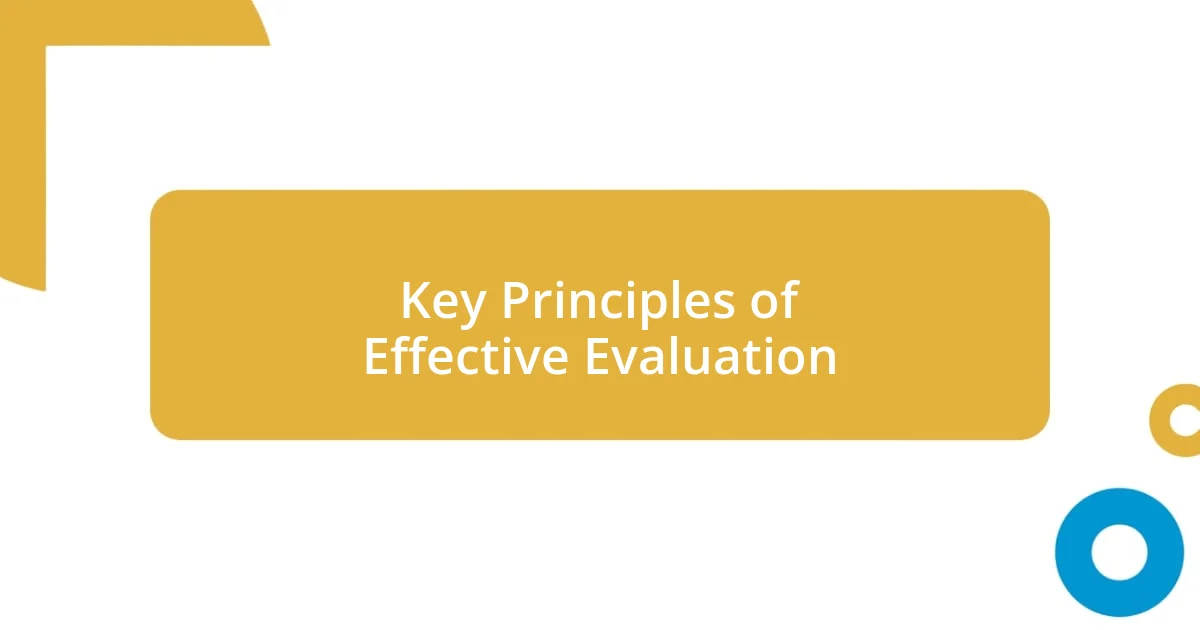
Key Principles of Effective Evaluation
Effective evaluation hinges on several key principles that can significantly enhance accountability. One principle that stands out is the clarity of purpose. I’ve often found that a well-defined framework that outlines specific goals makes a world of difference. I remember during a project where our objectives were scrambled. Once we took the time to lay everything out clearly, accountability naturally started to improve. It’s like turning on a light in a dark room—suddenly, everyone knows what they’re aiming for.
Another essential principle is the involvement of all stakeholders in the evaluation process. Engaging every team member fosters a sense of shared responsibility. I experience this during team retrospectives, where everyone shares their insights and feels heard. When team members contribute to the evaluation, it transforms the process from a mere check-up into a collaborative journey. Have you noticed how much more invested people become when their voices are part of the conversation?
Lastly, timely feedback is crucial for effective evaluation. I can’t stress enough how regular check-ins keep everyone aligned and motivated. In one project, we adopted weekly updates, which helped us identify issues before they snowballed into major problems. Timely feedback creates momentum and encourages team members to take ownership. It’s about maintaining the pulse of the project, ensuring accountability flows seamlessly throughout the process, don’t you think?
| Key Principle | Description |
|---|---|
| Clarity of Purpose | Having well-defined goals guides efforts and improves accountability. |
| Stakeholder Involvement | Engaging team members fosters shared responsibility and commitment. |
| Timely Feedback | Regular updates prevent issues from escalating and promote ownership. |
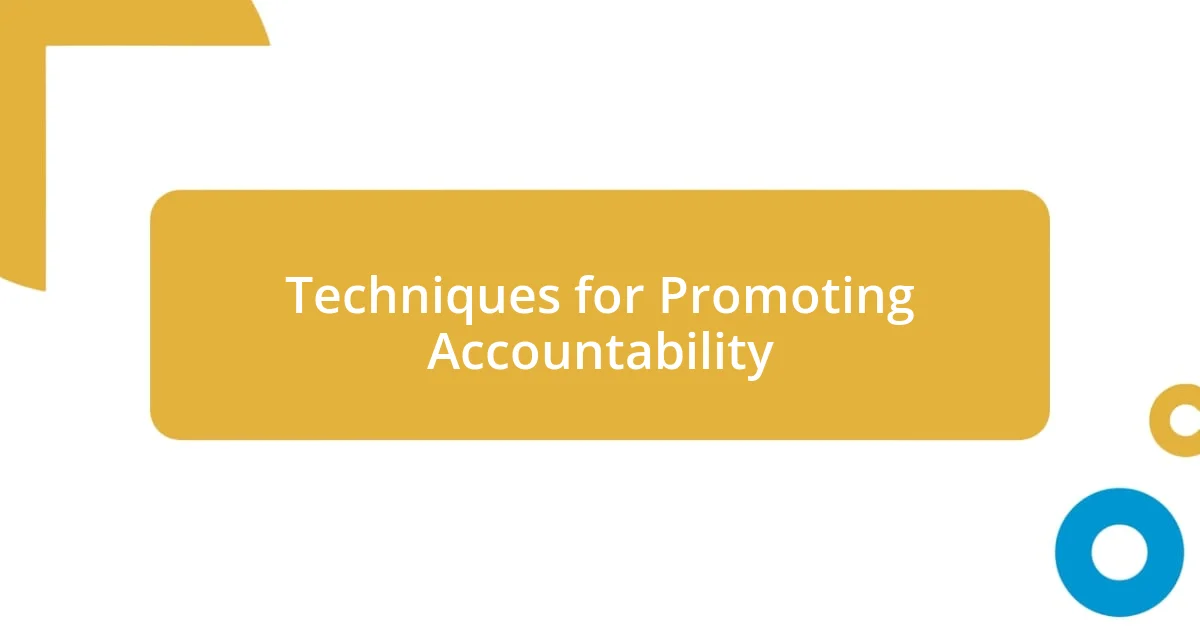
Techniques for Promoting Accountability
The first technique that comes to mind is establishing clear metrics. When I set specific, measurable goals, I’ve seen firsthand how it encourages team members to take ownership of their tasks. For instance, during a project with strict deadlines, I introduced a progress chart. Watching individuals track their contributions not only motivated them but fostered a sense of pride in their work. Isn’t it powerful to see your efforts visually represented?
Another effective technique is creating a culture of regular feedback. I remember a challenging period when our team struggled with a project’s direction. By incorporating brief daily stand-up meetings, we opened the floor for sharing frustrations and ideas. This practice not only clarified accountability but strengthened our bond. Have you ever felt how a simple shift in communication can lead to a drastic improvement in morale?
Lastly, I’ve found that recognizing achievements plays a crucial role in promoting accountability. In one project, I started celebrating small wins during team meetings. This practice didn’t just acknowledge hard work; it created an environment where everyone felt valued. When individuals know their efforts are seen and appreciated, they’re more likely to stay committed. Isn’t it remarkable how recognition can amplify a sense of responsibility?
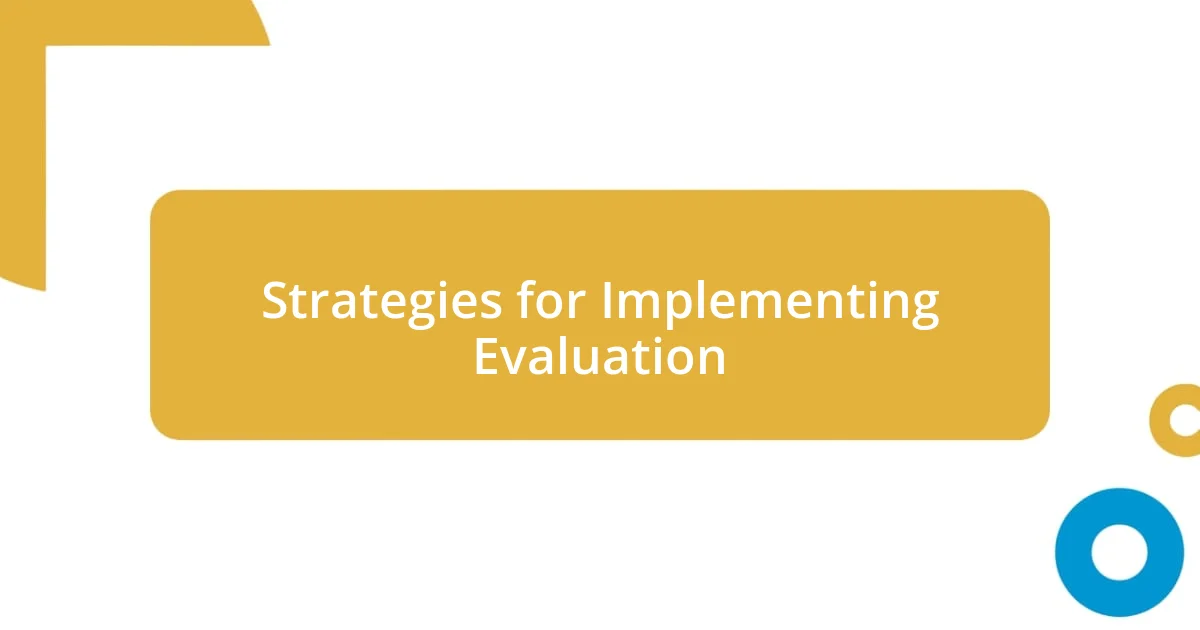
Strategies for Implementing Evaluation
One strategy I’ve embraced for implementing evaluation is using structured templates for feedback. In a previous role, I developed a simple evaluation form that focused on key project milestones. This not only guided our discussions during reviews but also provided a clear way to identify both successes and areas needing improvement. Have you ever noticed how a well-organized approach can streamline communication?
Another powerful tactic is setting up peer evaluations. I remember implementing this in a team project, where each member anonymously assessed their colleagues. This not only added a layer of accountability but also injected a sense of camaraderie. It’s interesting how putting constructive feedback into our peers’ hands can foster a culture of trust and openness—who wouldn’t want to be part of a team that actively supports one another?
Additionally, integrating technology can greatly enhance evaluation implementation. I’ve often relied on project management tools that allow for real-time tracking and shared access to updates. For example, during a recent initiative, using a shared online dashboard kept everyone on the same page. When transparency is built into the process, it’s astounding how it can propel motivation and commitment, wouldn’t you agree?
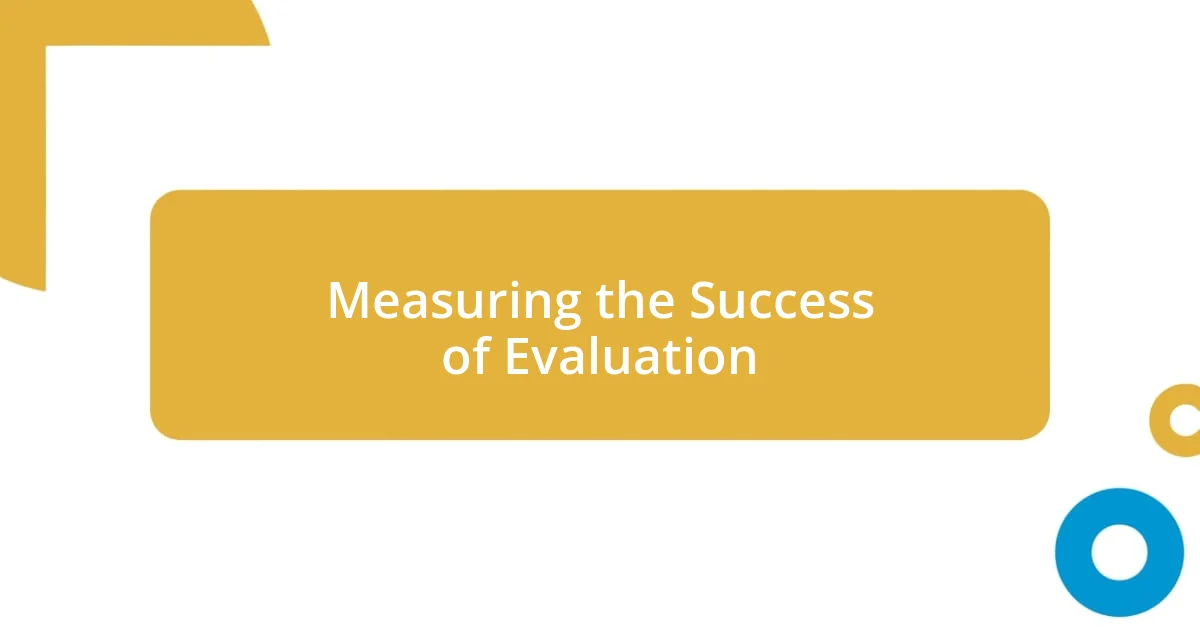
Measuring the Success of Evaluation
Measuring the success of evaluation can be an eye-opening experience. In one project, after implementing structured feedback forms, I noticed a significant improvement in team engagement. As we reviewed the feedback together, it became clear how much everyone valued their input and felt empowered to contribute. Isn’t it fascinating how feedback can transform perspectives, shifting from mere evaluation to genuine improvement?
I’ve also found that analyzing outcomes against our original metrics tells a powerful story. After tracking several projects, I realized that the most successful evaluations were those where clear, honest dialogue was encouraged. It’s not just about numbers; it’s about understanding what those numbers represent—changes in behavior, team dynamics, and even personal growth. How often do we overlook the deeper implications behind success metrics and lose sight of the real progress being made?
Lastly, I learned that following up on evaluations plays a critical role. Post-evaluation discussions can be where the magic happens. I remember a time when a follow-up meeting revealed unexpected insights from team members, igniting fresh ideas for future projects. It solidified the understanding that evaluation isn’t a one-off task but an ongoing journey toward improvement. Isn’t it rewarding to see how these conversations can spark innovation and drive collective accountability?
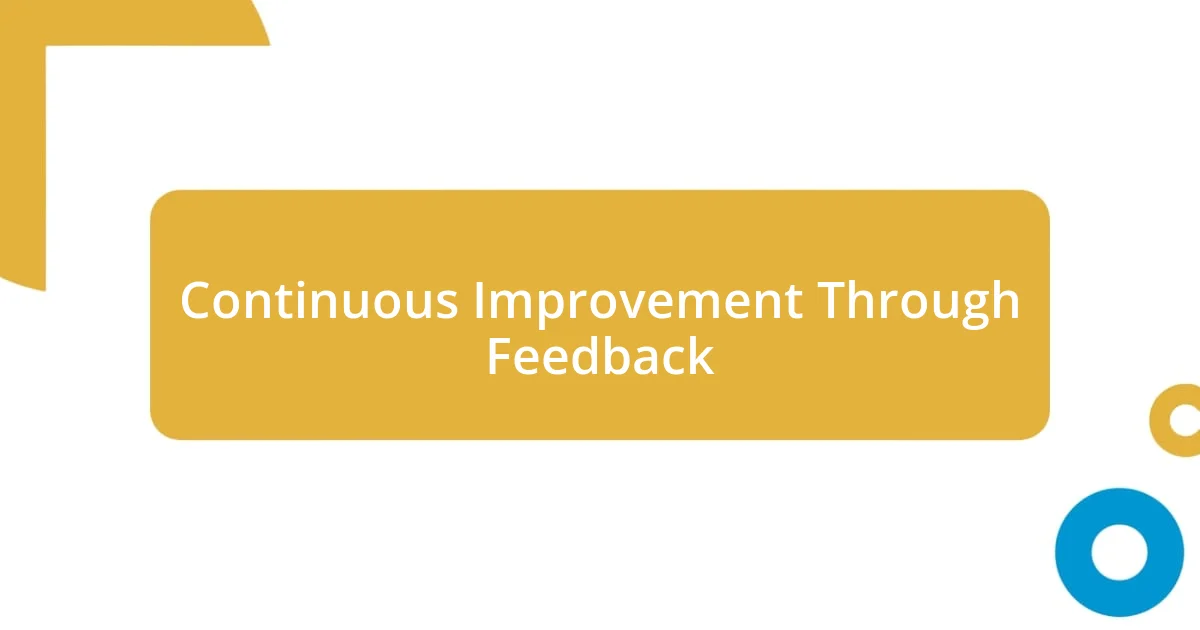
Continuous Improvement Through Feedback
Feedback is a powerful catalyst for continuous improvement. I recall a time when our team initiated regular feedback sessions after each project phase. Initially, some members were hesitant to share their thoughts. But as we established a safe environment, those sessions transformed into a gold mine of insights. Isn’t it amazing how simply encouraging open dialogue can lead to unforeseen breakthroughs in our processes?
Another experience that stands out for me involved a mentorship program I set up. I encouraged participants to seek feedback not only from me but also from their peers. Watching them embrace feedback as a tool for growth was genuinely inspiring. With each constructive critique, I could see the spark of motivation ignite. Have you ever experienced that moment when someone takes feedback to heart and uses it to elevate their work?
It’s also fascinating how minor adjustments based on feedback can result in significant improvements. One project was struggling due to a lack of clarity in roles. After discussing it openly, we redefined responsibilities and established checkpoints for feedback throughout the project lifecycle. The transformation was immediate; with everyone on the same page, productivity soared. It really made me appreciate just how vital a feedback loop is in facilitating not just accountability, but genuine progress.














